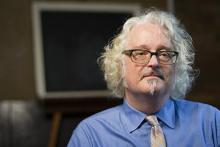STORY BY NANCY JOSEPH, AUGUST 2015 PERSPECTIVES NEWSLETTER
To teach Biofutures, a humanities course that explores legal, ethical, scientific, and commercial aspects of biotechnology, it helps to have a science background. And a humanities background. And a fascination with culture and society. And a willingness to think outside the box.
In other words, it helps to be Phillip Thurtle.
Thurtle, professor in the Comparative History of Ideas Program (CHID), developed Biofutures with colleagues in the School of Medicine and the School of Art about a decade ago, through a Simpson Center for the Humanities program aimed at interdisciplinary course development. They team-taught the course twice, but when that became cost prohibitive, Thurtle continued the class on his own.
With a background in philosophy, history, anthropology, and biochemistry — including an early job in a molecular immunology laboratory — Thurtle was uniquely qualified to take on the challenge. And the idea of bringing together students in the sciences, humanities, and social sciences to discuss the future of biotechnology excited him. It still does.
“This started as this quirky little class and now it’s drawing people from all over campus,” says Thurtle. “That’s one of the things I absolutely love about it. Humanities and social science students probe me on social justice issues right away, and science students ask me science questions to make sure I have my chops. I have to be aware of cutting-edge work in both the sciences and the humanities to teach something like this.”
The course explores biotechnology through a variety of lenses, including financial exchange, power, media literacy, imagination, and time and place. Discussions range from the exchange of body parts through organ donation to how we glean biotechnical information from the media. It covers the joining of organisms from different continents through gene splicing, and Supreme Court rulings on the types of genes that can be patented. “We’re at a really interesting time in our society when it comes to biotechnology,” says Thurtle. “We’re beginning to have a proliferation of biotechnological techniques, but not necessarily the conceptual apparatus to help guide us in thinking about the most ethical and creative ways for using those techniques.”
